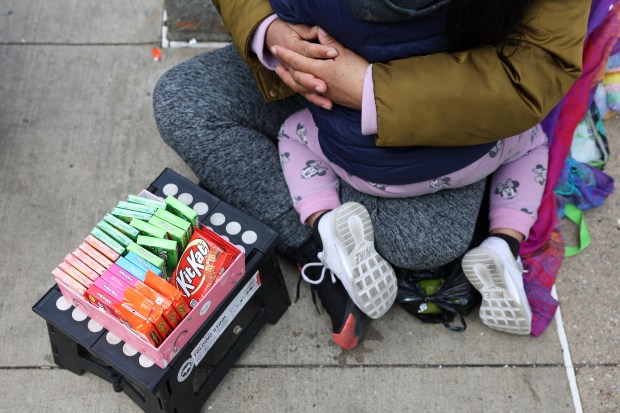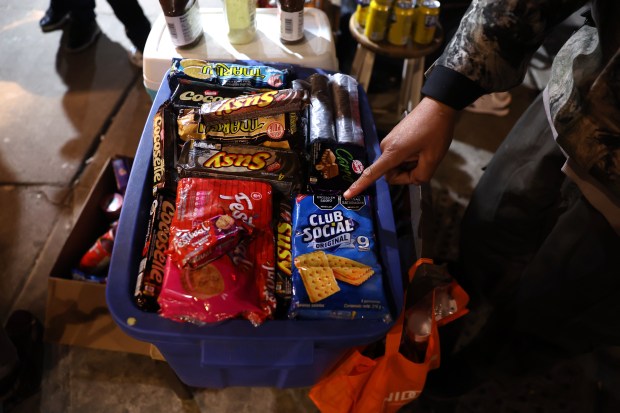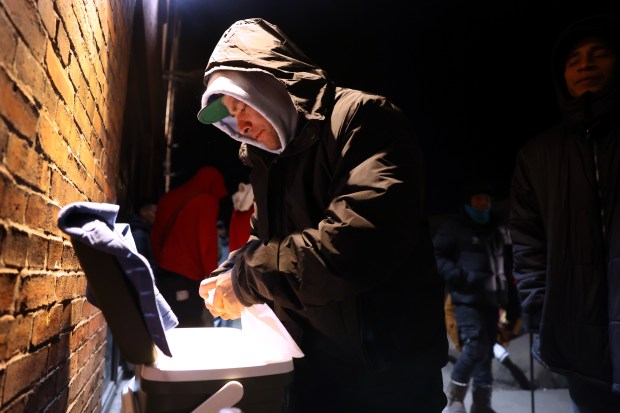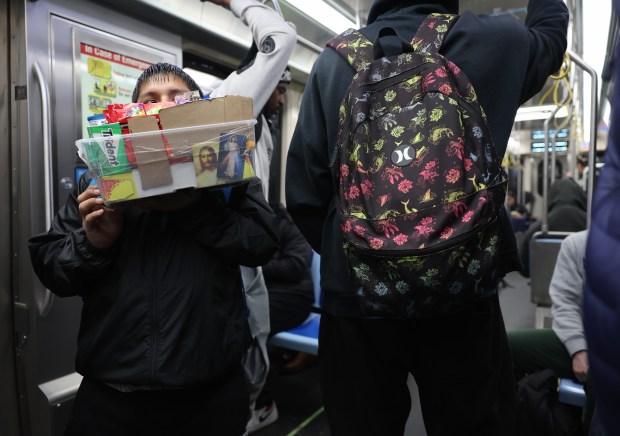On a chilly late winter evening, the smell of cooked meat washed over the traffic backed up outside the Salt Shed music venue.
The smell came from the folding tables and stools set up across the street, where several vendors were selling arepas, empanadas and pastelitos out of multicolored coolers. Benches and a shopping cart were packed with snacks and cans of Sprite and Fanta. Cigarettes were also available for sale, and the smell of smoke mixed with that of the Venezuelan street food.
This is where Edwin Bravo was selling tequeños, outside the migrant shelter he’s staying in. Venezuelans more established in the city bring him the precooked food, and in return take a cut of the money, he said.
But he expected to have enough customers to make a profit. The food at the shelter is terrible, he said, and he figured plenty of residents would take him up on his two-for-$5 special.
And as dinnertime neared, the stub of a side street wedged between the music venue and Metra tracks filled with migrants hanging out and looking for a familiar meal from Bravo and the other vendors. The sounds of setup for the Jason Isbell concert at the Salt Shed mixed with the Spanish music playing on the street corner as the crowd grew.
“The day I get a (work) permit, I’ll leave this place,” Bravo said in Spanish. “I’ll rent a home.”
Bravo and the others set up on the West Town corner are one type of the street vendors who are becoming an increasingly familiar sight, as those newly arrived in the area look for opportunities to work. They are part of an informal economy that has gained visibility as more than 36,000 people have arrived in Chicago from the southern border since August 2022.
The new arrivals are the latest additions to Chicago’s history of street vending. For years, immigrants to the city have sold tamales on street corners and out of coolers in bars. Paleteros have pushed carts in the city’s neighborhoods and at the lakefront, and eloteros have long been a staple of the city’s Mexican American neighborhoods.
In recent months, other types of street vending have also become more visible. Men and women walk through CTA trains selling chocolates and candy out of decorated bins. On a recent afternoon, several women from Ecuador sat on street corners around the Loop, selling gum, M&Ms, Reese’s and Skittles.
One of the sellers, Norma Allas, sat on a street corner with her 2-year-old daughter. She worked at a flower shop in Ecuador, but after facing few work opportunities there and increasing gang violence, she left, walking through jungle to the U.S., she said.
She thought she would be able to find a job when she arrived in the States, but couldn’t get a work permit, she said. When she saw other people selling on the street, she decided to try it.
“So, so many people are coming,” she said in Spanish. “And you have to pay for rent, for food.”
Advocates say stories like Allas’ show the need to expand work opportunities to more immigrants, both those newly arriving and those who have been here for years. Some of the new arrivals are eligible for work permits, depending on a variety of factors such as the country they left, the circumstances under which they left and when they arrived. But others are not eligible, and even those who are sometimes must overcome hurdles, advocates said. Efforts have been made to speed up the process for those who are eligible, but in some cases it can still take months.
The Biden administration has made efforts to address work eligibility for Venezuelans, in particular, who make up the majority of arriving migrants. That includes a move last fall to extend temporary protected status for Venezuelans who arrived before July 31, 2023, which fast-tracks their approval to work legally. The move was expected to cover an estimated 472,000 people nationally.

The Resurrection Project, a housing and immigration assistance agency based on the city’s Lower West Side, has held workshops to help some of those eligible get work authorization. So far, more than 1,900 work authorization cards have been issued to attendees, and U.S. Citizenship and Immigration Services is processing another roughly 2,000 applications, said Erendira Rendon, vice president of immigrant justice at the organization.
But left out of the picture entirely are immigrants in the country without legal permission who have been living in the city for years, which has been a frustration for many advocates and immigrants, she said.
“The eligibility criteria that has been set out has been very arbitrary and unfair,” she said.
Work authorization can provide a pathway to better-paying jobs with better benefits, which means workers will pay taxes at a higher rate and have more opportunities to contribute to their community, said Diego Samayoa, associate director of Centro Romero, an Edgewater-based organization that works with refugees and immigrants. Expanding eligibility would not only help those seeking work, but the private sector, too, he said.
Some business groups are also pushing to expand work authorization. Mark Denzler, president of the Illinois Manufacturers’ Association, said that nationally more than 600,000 manufacturing jobs are unfilled, including an estimated tens of thousands in Illinois. Many of the openings would be suitable for newly arrived migrants or immigrants who have lived in the U.S. for years without legal permission, if they were authorized to work in the country, he said.
In the meantime, those arriving are finding other ways to work. Bravo, selling outside the Salt Shed, said he makes about $30 a day in profit. Getting work authorization and a stable job would help him save to rent a home, he said.
Near Bravo’s cooler, Ruven Vartida sold pork, ham and egg arepas for $5 each. Vartida, 29, was a mechanic in Venezuela, but he began selling food after just days in the U.S.
“It’s better to do this than nothing,” he said.
Like Bravo, he purchased premade food from migrants and sold the arepas largely to other migrants, tapping into an informal ecosystem. He also buys Cokes at Walmart and sells them for $1, sometimes to migrants and sometimes to passersby.
“I think all new beginnings are difficult,” he said. “No one comes to a new country with everything. Everything is a process, and you have to adapt and fight.”
Chicago has long welcomed waves of immigrants, but the sheer number arriving in recent years, many with no family or support systems in the city, has perhaps made informal work more visible, said Megan Davis, director of legal services at social services nonprofit Erie House.

Rengi Jesus Faltime, 33, turned to street vending to help support his wife and 5-year-old daughter. He has been in the U.S. about eight months, long enough to move out of a shelter and into a home, he said. But that means he has $550 in monthly rent to pay.
Faltime worked at a shoe store in Venezuela and, on his journey north through the jungle, stopped for a time in Tapachula, Mexico, to work at a bakery and earn money. After he arrived in Chicago he worked for two months at a hotel but was laid off, he said. He looked for other work but struck out.
So he and his wife decided he would sell arepas stuffed with breaded chicken, or chicken mixed with bacon and ham, and pastelitos that she cooked in their home.
“I really don’t want to be on the street begging, and I don’t want to go back to a shelter either,” he said. “So the situation brought me here.”
He intends to look for permanent work once the weather warms up. But so far, selling outside the migrant shelter nearly every day for four months, he has been able to pay rent.
He and his wife search multiple stores for the most cost-effective ingredients to ensure they make a profit, he said. Some days he sells a few dozen arepas, and some days a few hundred. He strategically chose the corner across from the Salt Shed because it is visible to the street, and close to the shelter, he said.
In an area surrounded by other Venezuelans, he knows the familiar food will be a hit. He often sells out in a matter of hours, even when there is a steady supply nearby from other vendors. Occasionally he also sells to other people walking by, he said.
The business isn’t without risks. Sometimes police ask the vendors to clear out, saying it’s illegal to sell without a street vendor permit, he said.

Chicago generally requires those who sell prepared foods and peddlers who sell uncut fruits and vegetables or other goods to be licensed. In 2023, the city’s Department of Business Affairs and Consumer Protection issued 730 enforcement actions to 155 peddlers and vendors, including cease-and-desist orders and citations, according to department data. Police can also enforce license violations, the department said.
Not every new vendor has encountered enforcement, though.
Andris Vasquez, who came to the U.S. from Caracas, Venezuela, about four months ago, has been selling empanadas for about a month. Once a butcher in Venezuela, the 23-year-old now lives in a Chicago Heights home with his mom, who has been in the U.S. longer than he and has work authorization, he said.
Back in Caracas, vendors selling traditional stuffed masa hallacas and a type of dumpling called bollos were common, he said.
Here, he and his mother carefully tally up the cost of the flour, oil, beef and chicken she uses to make the empanadas. They’ll spend about $150 for four days’ worth of empanadas, and on a good day he can make $80 to $100 selling.
“Here there are mostly Venezuelans, and they know empanadas,” he said in Spanish, from outside the West Town migrant shelter. “I don’t speak English, and I don’t know how to offer them to people from the U.S.”
Vasquez would prefer to have a more stable job, he said. But after leaving Venezuela, uncertain of what the future held for him there, he and his mother now have bills to pay.
“We have to pay for water and electricity,” he said. “I have to do something to make money.”




